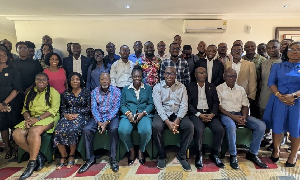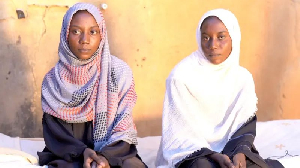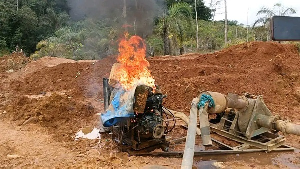Sunyani Nov. 20, GNA- The Women and Juvenile Unit (WAJU) of the Ghana Police Service is to be expanded to a divisional status by the end of the year to address and stem domestic violence against women, Brong Ahafo Regional Police Commander, Mr Douglas Akrofi Asiedu, said on Thursday.
He was speaking at the opening of a one-day sensitization workshop for WAJU personnel and selected police officers in Sunyani.
The workshop aimed at equipping the 30 participants from Berekum, Wenchi and Sunyani on how to investigate and address domestic cases with understanding, commitment and professionalism.
Mr Akrofi Asiedu noted that the rights of women and children had been abused for long and as such must be tackled with all the seriousness by the police to save victims from embarrassing situations.
The Regional Commander advised men who meted out such atrocities to women to put a stop to it "since the police service will no longer tolerate and allow such acts to continue".
Women play a very important role at home, in our communities and in national development and must therefore be protected in all situations, he added.
Mr Akrofi Asiedu advised women to report all forms of abuse against them to the nearest police station and urged the police to give equal attention to domestic cases to bring perpetrators to book.
Mr Akrofi Asiedu expressed regret that missing juveniles were sometimes kept at the charge office, a practice which he said was against the law since children under 12 years must not be kept together with adults in cell.
He said such children were supposed to be given to the most senior policewomen to take care of and support them to even become part of their families.
The Police Commander said women police was established in the service mainly to cater for juvenile cases and expressed concern that some policewomen refused to accept such children, just because they did not know their responsibilities in the service.
He urged station officers to educate them on such matters.
Assistant Superintendent of Police (ASP) Alex Yartey Tawiah urged personnel to become abreast with laws relating to domestic violence and to understand the dynamics and methodology in receiving complaints on domestic violence.
He stated that a study on levels of domestic violence in the country showed that one out of every three women had suffered some form of violence whose effects include death, physical injury and psychological problems.
ASP Tawiah said as soon as a complaint of domestic violence is received, it must be established if victim is in any immediate danger or required immediate medical assistance.
Most domestic victims who report at the police station are already physically and psychologically traumatized and must be supported to overcome their conditions, he said.
Mr Kofi K. Agyei-Adoquaye, Acting Regional Population officer, said women and girls' ability to protect themselves from sexually transmitted diseases like STD/AIDS was drastically weakened by the threat of violence, which exposed them to forced and unprotected sex.
Women who are raped do not only suffer physical, emotional and sexual violations but are also exposed to infections from sexually transmitted diseases.
Regional News of Thursday, 20 November 2003
Source: GNA












